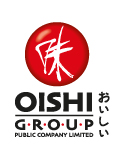Sustainable Supply Chain
Sustainable Supply Chain Management will increase opportunities, reduce risks and enhance the competitiveness of the business. Therefore, OISHI's supply chain management approach focuses on the efficient use of resources and the production of healthy and environmentally friendly products, as well as communicating sustainable social responsibility in all dimensions both economically, socially and environmentally to trading partners in the supply chain. This is to create shared value for partners, consumers and society as a leading Japanese food and beverage company in Thailand.
(1) Efficient Procurement
The shortage of key raw materials is one of the company's major risks. In order to provide effective procurement of raw materials, OISHI focuses on working closely with partners in planning the procurement of raw materials, as well as preparing substitute raw materials in case of emergency for business continuity, by holding regular meetings with key partners. In addition, OISHI works with Thai Beverage Public Company Limited (“ThaiBev”) and companies in ThaiBev Group in the selection and procurement process of key raw materials to merge cooperation in procurement of raw materials for maximum benefits. This will increase bargaining power and to ensure that all raw materials are in accordance with the established criteria.
OISHI has a clear policy that emphasizes the selection of quality, nutritious ingredients from entrepreneurs and farmers in the country, consisting of:
- Using high quality tea leaves from local farmers, which comes from agricultural areas that are certified according to organic agriculture standards of the Ministry of Agriculture and Cooperatives (Thailand).
- The use of products as ingredients in food and beverage production from entrepreneurs in the Pracharat (civil-state cooperation) project and local entrepreneurs with good management systems.
- Collaborate with companies in ThaiBev Group in order to get the most out of the synergies in terms of sourcing raw materials, which will increase the bargaining power and to ensure that the raw materials are in accordance with the established criteria.
(2)Sustainable Procurement
Sustainable procurement is a cornerstone of a sustainable supply chain because procurement is the beginning of the product life cycle and plays an important part in determining the quality and impact of choosing the right raw materials and its sources. For this reason, OISHI pays close attention to the selection of raw materials, products, services and partners, taking into account their impact on society and the environment, both that will occur at present and that may have a long-term effect.
OISHI attaches importance to accurate management, as well as having systemization and procurement process, which is efficient, transparency and fairness. At the same time, the company attaches great importance to the operations of its business partners by incorporating risk management mechanisms for goods and services in parallel with the management of trade partners' risks, from the selection of raw materials to the screening of partners, and the inspection of work, to be in accordance with the standards and appropriate management processes, by taking into account environmental and social factors and good corporate governance.
In addition, OISHI added a strong policy to deal with new and emerging diseases that may arise in the future, to ensure that products and services delivered to consumers are of good quality and safety. For example, in 2020-2021, there is a severe epidemic situation of COVID-19 around the world, including in Thailand. It has a huge impact on the business. Therefore, in the management of partners during the COVID-19 situation, OISHI has prepared a support plan as follows:
- Explore the availability of partners and provide alternative partners and make a list of risk product groups such as products which are key raw materials, products with high consumption volume, and products imported from abroad.
- Prepare substitute raw materials in case the main raw materials are insufficient.
- Work more with partners to resolve issues as well as obtaining appropriate support.
- Hold regular meetings with key sourcing partners and work closely on raw material procurement planning, including the provision of substitute raw materials in case of emergency when the main raw materials are insufficient to ensure business continuity.



